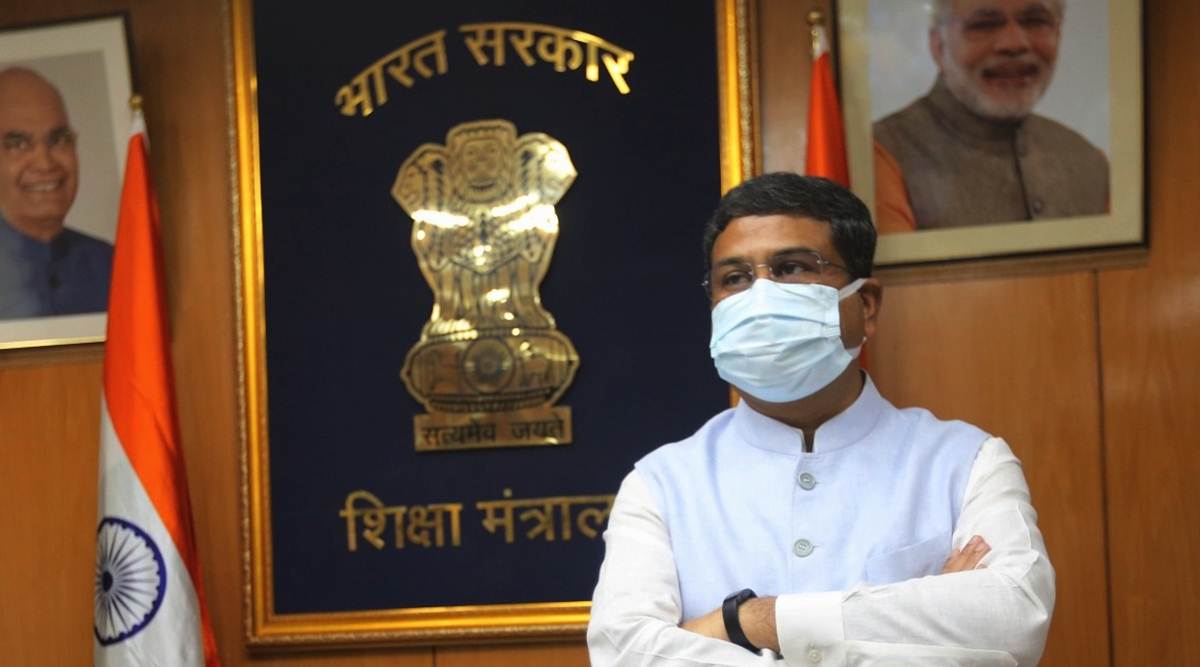 Union Education Minister Dharmendra Pradhan on Thursday. (Express photo by Tashi Tobgyal)
Union Education Minister Dharmendra Pradhan on Thursday. (Express photo by Tashi Tobgyal) Dharmendra Pradhan’s first day in office as Union Education Minister started with Prime Minister Narendra Modi’s virtual interaction with heads of 106 centrally-funded technical institutions (CFTIs), including 23 IITs, 31 NITs, and 25 IIITs. During the meeting, Modi underlined the importance of offering technical education in regional languages, a proposal the IITs have opposed in the past.
Pradhan, who succeeds Ramesh Pokhriyal, didn’t take any questions from journalists after the hour-long meeting on Thursday. However, he later tweeted that his ministry was “committed to make students and youth the primary stakeholders in propelling India towards an equitable knowledge society”.
The interaction focused on the research and development carried out by the CFTIs in the last two years, especially scientific solutions meant to address challenges thrown up by the Covid pandemic. IIT-Madras, IIT-Bombay, IIT-Kanpur and IISc-Bangalore made presentations highlighting their recent innovations and the future roadmap of the institutes.
Together with MoS Education @Drsubhassarkar ji, @Annapurna4BJP ji and @RanjanRajkuma11 ji joined Hon. PM Shri @narendramodi’s interaction with Directors of centrally-funded technical institutions @iiscbangalore, @iitbombay, @iitmadras and @IITKanpur. pic.twitter.com/U3X8xMe6M4
— Dharmendra Pradhan (@dpradhanbjp) July 8, 2021
So, while the IIT-Kanpur director shared the institute’s work on cancer cell therapy, prediction of Covid hotspots and ventilator production, the IISc-Bangalore director spoke of indigenously developed oxygen concentrators and a cheap and novel test to detect the presence and response of antibodies against the virus.
Sources said the meeting, invitations for which were sent out a week ago, was called against the backdrop of the latest QS World University Rankings. “Several Indian universities have improved their performance in the rankings. The PM wanted to understand the research work being carried out by the institutions. IISc, IIT-Bombay, IIT-Madras and IIT-Kanpur were selected to make the presentation because of their impressive performance in the QS Rankings,” a ministry official said.
According to a statement issued by the Prime Minister’s Office, Modi emphasised the need to adapt to the changing environment and emerging challenges and said that this requires the institutions to reinvent and re-evaluate themselves and develop alternative and innovative models according to the country and society’s present and future needs.
“The PM added that we need to develop an ecosystem of technological education in Indian languages and translate global journals into regional languages,” the statement reads.
In November, the Education Ministry had announced that it would push for technical education, especially engineering, in regional languages, starting from 2021-22. The announcement was in line with the new National Education Policy that calls for education in one’s mother tongue as far as possible. The response of the IITs, however, was lukewarm. Most argued that since the demography of students studying in IITs is diverse, offering B.Tech programmes in several regional languages would not be feasible.
Soon after the PM’s interaction, Pradhan tweeted, “Guided by PM Narendra Modi’s vision, we are committed to work with a forward-thinking attitude in inculcating a culture of innovation, encouraging research, entrepreneurship, incubation centres and developing futuristic solutions in higher education for an Aatmanirbhar Bharat.”
The meeting was also attended by the three new Ministers of State Annapurna Devi, Subhas Sarkar and Rajkumar Ranjan Singh.
- The Indian Express website has been rated GREEN for its credibility and trustworthiness by Newsguard, a global service that rates news sources for their journalistic standards.

